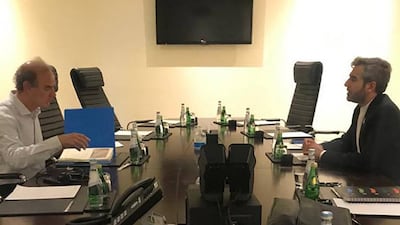Indirect negotiations between Iran and the US over Tehran’s nuclear deal with world powers ended on Wednesday in Qatar after failing to make significant progress amid a growing crisis over Iran's atomic programme.
European Union mediator Enrique Mora described the two days of talks in Doha as intense.
“Unfortunately, not yet the progress the EU team as co-ordinator had hoped for,” Mr Mora wrote. “We will keep working with even greater urgency to bring back on track a key deal for non-proliferation and regional stability.”
US Special Envoy on Iran Robert Malley spoke to the Iranians through Mr Mora during the talks. Mr Mora then took messages to Tehran's top nuclear negotiator, Ali Bagheri Kani.
Mr Mora’s comments came hours after the semi-official Tasnim news agency, believed to be close to Iran’s Islamic Revolutionary Guard Corps, described the negotiations as finished hours before they ended and having “no effect on breaking the deadlock in the talks”.
The Doha talks took place months after talks in Vienna among all parties to the deal were paused.
In the time since, Iran shut off surveillance cameras set up by international inspectors in response to a resolution by the International Atomic Energy Agency rebuking Tehran for its undeclared nuclear work.
In New York, the UN Security Council held a meeting on Thursday to discuss resolution 2231, which endorses the nuclear deal, formally known as the Joint Comprehensive Plan of Action (JCPOA).
The EU representative said that negotiators may be running out of time to restore the agreement, which puts curbs on Iran's nuclear programme.
“I am concerned that we might not make it over the finishing line,” the bloc's ambassador to the UN Olof Skoog told the Security Council.
“My message is, seize this opportunity to conclude the deal, based on the text that is on the table. The time to overcome the last outstanding issues, conclude the deal, and fully restore the [agreement] is now.”
Representatives from France, Germany and the UK issued a joint statement blaming Iran for the stalemate.
“Iran has been taking unprecedented steps to accelerate the pace of its nuclear programme in the past three years and continues to escalate unabatedly,” the representatives said.
They added that Iran's actions “are rapidly unsettling the balance of the package we had negotiated over many months to restore the JCPOA and closing the window for an immediate diplomatic solution”.
“The impact on international security and the international non-proliferation regime of such an outcome would be grave and long lasting.”
UK representative to the UN Barbara Woodward called for a Plan B if the deal collapses.
If the deal collapses, she said, “it will be incumbent on this council to take decisive steps to ensure that Iran does not develop a nuclear weapon”.
And with Iran and the US blaming each other for the failure of the talks, it is unclear when — or if — there will be another round of negotiations.
Iranian news agency Tasnim claimed that the US position did not include “a guarantee for Iran benefiting economically from the deal”, quoting what it described as unnamed “informed sources”.
“Washington is seeking to revive the [deal] in order to limit Iran without economic achievement for our country,” the Tasnim report claimed. A key sticking point is American sanctions on Iran's Islamic Revolutionary Guard Corps.
US disappointed
After the Tasnim report, Iranian Foreign Ministry spokesman Nasser Kanaani issued a statement describing the talks as “being held in a professional and serious atmosphere”.
He later said that Iran and Mr Mora “will be in touch regarding the continuation of the route and the next stage of the talks”.
However, it is not clear if there will be another round of talks on the deal.
The US State Department said that Iran “raised issues wholly unrelated to the JCPOA and apparently is not ready to make a fundamental decision on whether it wants to revive the deal or bury it”.
“Indirect discussions in Doha have concluded, and while we are very grateful to the EU for its efforts, we are disappointed that Iran has, yet again, failed to respond positively to the EU’s initiative and therefore that no progress was made,” the State Department said.
Iran and world powers agreed in 2015 to the nuclear deal, in which Tehran drastically limited its enrichment of uranium in exchange for the lifting of economic sanctions. In 2018, US president Donald Trump unilaterally withdrew the US from the accord, raising tension across the wider Middle East and sparking a series of attacks and incidents.
Talks in Vienna about reviving the deal have been on “pause” since March.
Since the deal’s collapse, Iran has been running advanced centrifuges and rapidly growing stockpiles of enriched uranium.
Tehran continues to suffer under intense economic sanctions while the West again hopes to curtail Iran’s nuclear programme.
Iranian opposition and human rights activists blame poor governance and the use of the country's limited resources to support proxies in the region for deteriorating living conditions at home.









